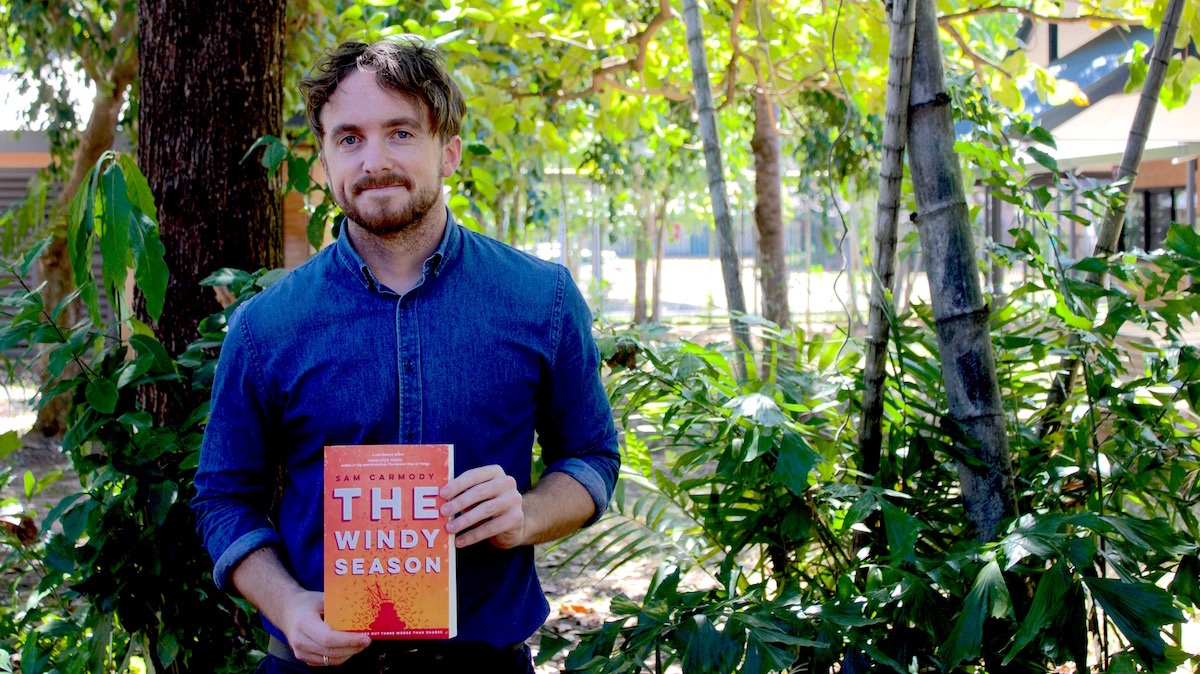

Batchelor Institute lecturer Samuel Carmody has just launched his debut novel The Windy Season nationwide. Carmody, who has been teaching the Diploma in Creative and Indigenous Writing at Batchelor Institute since August 2015, is also a previous recipient of the Mary Grant Bruce Award as part of the Fellowship of Australian Writers (FAW) National Literary Awards.
Carmody’s book tells the story of a young fisherman who goes missing from the crayfish boats in the fictional Western Australian town of Stark. His younger brother Paul seems to be the only one searching, as he takes his brother’s place on the boat captained by their troubled cousin. It is a gripping thriller that explores the dark underside of a small fishing village.
The story was inspired by Carmody’s connection with the ocean and him coming to terms with his somewhat complex relationship with it.
“I grew up near the ocean. My childhood years were in Geraldton, in rural WA. I have surfed and fished and dived since I was in primary school. But my love for the sea has always been coupled with a grim fear of it. I think everyone in WA has that sort of relationship to it,” Carmody explained.
“Sharks are a huge deal over there. People are terrified of them. They might even say that they hate them. But I think it’s more complicated than hate. There is almost a love there too, as much as people might deny it. If there is a shark sighting, you’ll see hundreds of people crammed on the beach or on the cycle path above the sea, all trying to capture a glimpse. It is horror and fascination. I think that is what underlies the poetics of The Windy Season. A portrait of that horror and fascination that Australians have with the sea.”
Carmody has been heralded as one the country’s most exciting new literary voices, and he brings his experience and skills to his classes at Batchelor Institute.
As for his creative writing students, Carmody says that the learning experience goes both ways.
“My students are passionate about writing. They are thoughtful and courageous and they teach me as much about writing as I do them. The writing class isn’t all seriousness, either. There is a lot of laughing. My students are very funny.”
The Diploma in Creative and Indigenous Writing provides students with the opportunity to develop writing skills in a variety of genres, and establish a firm knowledge base for the strengthening of Indigenous culture through an understanding of Indigenous and non-Indigenous writing traditions.
The course units introduce students to the tool kit of creative writing, which they will be able to apply to short story writing, poetry, writing for stage and short film and personal narratives. In particular, the course emphasises how these genres continue to be used by Indigenous peoples in Australia and elsewhere to articulate their own ‘voice’, and to communicate their histories and contemporary experiences to, and within, dominant non-Indigenous powers and the broader society.
“I think my favourite thing is seeing students grow through the writing process, finding the confidence to explore personal and family histories, and confront powerful subjects, creating something potent and beautiful in the process. It is also exciting seeing new talent,” said Carmody.
The course offers a unique opportunity for writers to develop their own voice and can help to strengthen cultural connections through artistic expression. There is also a growing interest in the work of Indigenous writers, whose unique and authentic styles of writing are gathering attention all over the globe.
“Indigenous novelist Tony Birch has said Australia’s literary future is in Indigenous voices. Never before have so many Indigenous authors been more widely published,” said Carmody.
“Writers like Anita Heiss, Kim Scott, Alexis Wright who have global readerships. People all over the world want to read what our Indigenous writers have to say”.
For those interested in becoming writers, Carmody says that it is simply a matter of getting started.
“My main advice is to simply get into it. There is no perfect time to write. And even when you’re not having a good writing day, you’re still doing important work,” said Carmody.
“As Margaret Atwood says, if she waited for perfection she never would write a word. So just write and write and write. And see what you discover”.
For those interested in purchasing The Windy Season, it is available online here.
